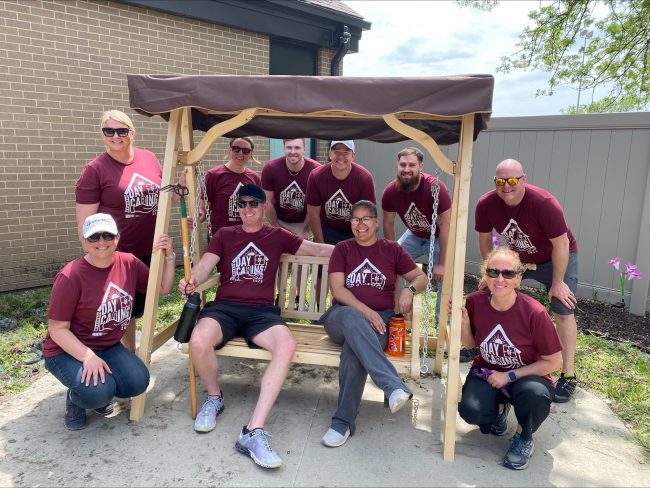 Klein (sitting on bench, left) with a team of coworkers after spending a day volunteering for a United Way Day of Caring event in Eastern Iowa last year. (Credit/Veridian CU)
Klein (sitting on bench, left) with a team of coworkers after spending a day volunteering for a United Way Day of Caring event in Eastern Iowa last year. (Credit/Veridian CU)
Name: Steve Klein
Credit union: Veridian Credit Union ($7.4 billion, Waterloo, Iowa)
Recommended For You
Title: Vice President of Branches
Age: 43
Number of years at current credit union: 21
Educational background: Bachelor of Arts (emphasis on organizational psychology) from the University of Northern Iowa
 Steve Klein
Steve Klein CU Times: What are your key responsibilities in your current role?
Klein: The VP of Branches is responsible for leading the strategic and tactical direction of Veridian's branch network. It includes coaching and developing team members in areas of member satisfaction, employee satisfaction, diversification, growth, sales and financial stability.
CU Times: What drew you to the credit union industry?
Klein: The 'people helping people' philosophy is what drew me in and what's kept me here. I've been a credit union member since my parents opened my first account, and I always appreciated how they created a personal relationship with my family. I started working at Veridian as a college student with intentions to graduate and move out of the Midwest. I quickly realized the credit union culture, and Veridian's culture specifically, was special. The rest is history.
CU Times: What unique skills, experience and attributes do you bring to your role?
Klein: So much of what we do as leaders involves connecting with people and building relationships. I spent some time early in my career in Veridian's Learning and Development department. That, more than any other professional experience I've had, helped me learn how to connect with people on a personal level. It's helped shape my career ever since.
CU Times: What are some of the biggest differences between working in your current executive level role and your previous, non-executive roles?
Klein: My biggest shift has been from focusing on the operational side of serving our members to a more strategic role. For years, I've focused my energy on creating the best member and employee experience possible in the branches within the region I led. That will continue in my new role, though my approach will shift to be more strategic and geographically broad. Each of our markets is unique with its own set of challenges and opportunities. Now I'm working with branch teams across our field of membership on strategies that ensure our employees' and members' success.
CU Times: How would you describe your current leadership style?
Klein: I think it's best described as a balance between laid back and focused. If you give people opportunities to work on things they're passionate about, they're more engaged and fulfilled in their work, and our members become beneficiaries of that. We spend so many hours together at work, and we should enjoy our time together. I've had the good fortune of meeting a lot of talented, passionate people and participating in a lot of great work at Veridian. We set high expectations, we work hard and we have fun along the way.
CU Times: Do you approach your job any differently now compared to how you did pre-pandemic? If yes, how so?
Klein: I do. The pandemic demonstrated the importance of constant, open communication. Especially in the early days of the pandemic, information was changing quickly. We prioritized regular communication, sharing information early and often, and we made extra time available to discuss questions and concerns. Ever since, I've been more mindful to carry that approach forward. The communication and relationships on my team are better because of it.
CU Times: What's next for you on your executive career journey? Do you have any specific career goals you're working toward?
Klein: I'm still in the early stages of my new role, and I am focusing primarily on learning right now. In my first 90 days, I've prioritized visiting as many branches as possible to get to know our branch teams better and learn more about the markets we serve. Successful leadership is built on trust, and trust doesn't just happen. It needs to be built over time. My goal is to build trusting relationships with every member of our branch team, learn what obstacles are getting in the way of creating the best member and employee experience possible, and work to eliminate those barriers.
CU Times: What big-picture impact do you hope to make within your credit union, as well as for your members and community?
Klein: During a recent team meeting, we talked about legacy and what leaving our mark looks like. I've thought a lot about that since. We're all in our roles temporarily. None of us will be here forever. It's important that we leave our teams, our departments and our work in a better spot than we found them. My goal is to take an excellent member and employee experience and make it even better.
CU Times: What career advice would you give your younger self?
Klein: You don't know as much as you think you do. Like any 21-year-old, I thought I had the world figured out, that I deserved more sooner. In hindsight, that couldn't have been further from the truth. If I had the chance, I would tell my younger self to talk less and listen more. It's amazing what you can learn when you truly take the time to listen and observe those around you.
Would you or someone you know like to share your journey to credit union leadership? Please reach out to Natasha Chilingerian at [email protected]. To qualify, the individual must be a part of a credit union's leadership team or C-suite, and have a compelling story to share about their rise to their current leadership role.

